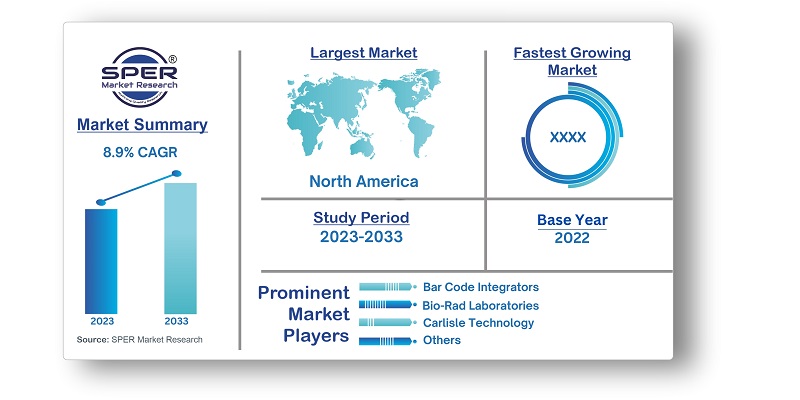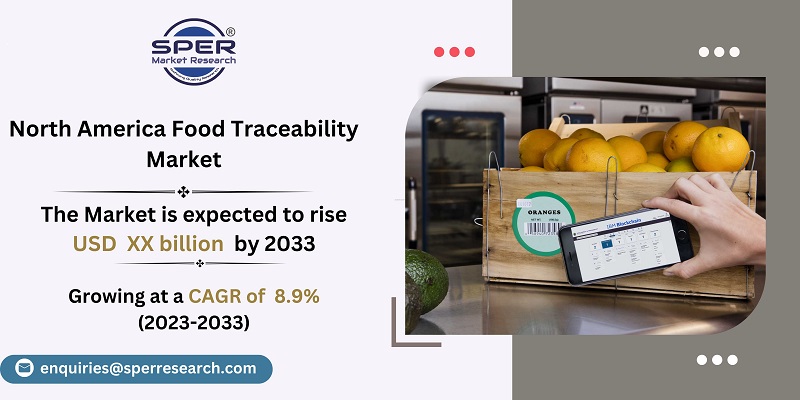
North America Food Traceability Market Growth, Size, Trends, Share, Demand and Future Outlook
North America Food Traceability Market Size- By Type, By End User, By Software- Regional Outlook, Competitive Strategies and Segment Forecast to 2033
| Published: Jan-2024 | Report ID: FOOD2416 | Pages: 1 - 158 | Formats*: |
| Category : Food & Beverages | |||


| Report Metric | Details |
| Market size available for years | 2019-2033 |
| Base year considered | 2022 |
| Forecast period | 2023-2033 |
| Segments covered | By Type, By End Use, By Software |
| Regions covered |
|
| Companies Covered | Bar Code Integrators, Inc., Bio-Rad Laboratories, Inc., C.H. Robinson Worldwide, Inc., Carlisle Technology, Cognex Corporation, Food Forensics Ltd., Honeywell International, Inc., Optel Group, SGS S.A., Zebra Technologies Corporation, Others |
- Certification and Inspection Agencies
- Consumers and Advocacy Groups
- Food Producers and Manufacturers
- Logistics and Transportation Companies
- Research and Consulting Firms
- Retailers and Distributors
- Technology Providers
- Others
| By Type: |
|
| By End Use: |
|
| By Software: |
|
- North America Food Traceability Market Size (FY’2023-FY’2033)
- Overview of North America Food Traceability Market
- Segmentation of North America Food Traceability Market By Type (Barcodes, Biometrics, Global Positioning Systems, Infrared, Radio Frequency Identification, Others)
- Segmentation of North America Food Traceability Market By End Use (Bakery & Confectionary, Dairy Products, Fish, Meat, & Seafood, Fruit Pulp & Concentrates, Fruits & Vegetables, Processed Food, Others)
- Segmentation of North America Food Traceability Market By Software (Enterprise Resources Planning, Laboratory Information Systems, Supply Chain Management, Warehouse Software, Others)
- Statistical Snap of North America Food Traceability Market
- Expansion Analysis of North America Food Traceability Market
- Problems and Obstacles in North America Food Traceability Market
- Competitive Landscape in the North America Food Traceability Market
- Impact of COVID-19 and Demonetization on North America Food Traceability Market
- Details on Current Investment in North America Food Traceability Market
- Competitive Analysis of North America Food Traceability Market
- Prominent Players in the North America Food Traceability Market
- SWOT Analysis of North America Food Traceability Market
- North America Food Traceability Market Future Outlook and Projections (FY’2023-FY’2033)
- Recommendations from Analyst
1.1. Scope of the report1.2. Market segment analysis
2.1. Research data source2.1.1. Secondary Data2.1.2. Primary Data2.1.3. SPER’s internal database2.1.4. Premium insight from KOL’s2.2. Market size estimation2.2.1. Top-down and Bottom-up approach2.3. Data triangulation
4.1. Driver, Restraint, Opportunity and Challenges analysis4.1.1. Drivers4.1.2. Restraints4.1.3. Opportunities4.1.4. Challenges4.2. COVID-19 Impacts of the North America Food Traceability Market
5.1. SWOT Analysis5.1.1. Strengths5.1.2. Weaknesses5.1.3. Opportunities5.1.4. Threats5.2. PESTEL Analysis5.2.1. Political Landscape5.2.2. Economic Landscape5.2.3. Social Landscape5.2.4. Technological Landscape5.2.5. Environmental Landscape5.2.6. Legal Landscape5.3. PORTER’s Five Forces5.3.1. Bargaining power of suppliers5.3.2. Bargaining power of buyers5.3.3. Threat of Substitute5.3.4. Threat of new entrant5.3.5. Competitive rivalry5.4. Heat Map Analysis
6.1. North America Food Traceability Market Manufacturing Base Distribution, Sales Area, Product Type6.2. Mergers & Acquisitions, Partnerships, Product Launch, and Collaboration in North America Food Traceability Market
7.1. North America Food Traceability Market Value Share and Forecast, By Type, 2023-20337.2. Barcodes7.3. Biometrics7.4. Global Positioning Systems7.5. Infrared7.6. Radio Frequency Identification7.7. Others
8.1. North America Food Traceability Market Value Share and Forecast, By End Use, 2023-20338.2. Bakery & Confectionary8.3. Dairy Products8.4. Fish, Meat, & Seafood8.5. Fruit Pulp & Concentrates8.6. Fruits & Vegetables8.7. Processed Food8.8. Others
9.1. North America Food Traceability Market Value Share and Forecast, By Software, 2023-20339.2. Enterprise Resources Planning (ERP)9.3. Laboratory Information Systems9.4. Supply Chain Management (SCM)9.5. Warehouse Software9.6. Others
10.1. North America Food Traceability Market Size and Market Share
11.1. North America Food Traceability Market Size and Market Share By Type (2019-2026)11.2. North America Food Traceability Market Size and Market Share By Type (2027-2033)
12.1. North America Food Traceability Market Size and Market Share By End Use (2019-2026)12.2. North America Food Traceability Market Size and Market Share By End Use (2027-2033)
13.1. North America Food Traceability Market Size and Market Share By Software (2019-2026)13.2. North America Food Traceability Market Size and Market Share By Software (2027-2033)
14.1. North America Food Traceability Market Size and Market Share By Region (2019-2026)14.2. North America Food Traceability Market Size and Market Share By Region (2027-2033)14.3. Canada14.4. Mexico14.5. US14.6. Rest of North America
15.1. Bar Code Integrators, Inc.15.1.1. Company details15.1.2. Financial outlook15.1.3. Product summary15.1.4. Recent developments15.2. Bio-Rad Laboratories, Inc.15.2.1. Company details15.2.2. Financial outlook15.2.3. Product summary15.2.4. Recent developments15.3. C.H. Robinson Worldwide, Inc.15.3.1. Company details15.3.2. Financial outlook15.3.3. Product summary15.3.4. Recent developments15.4. Carlisle Technology15.4.1. Company details15.4.2. Financial outlook15.4.3. Product summary15.4.4. Recent developments15.5. Cognex Corporation15.5.1. Company details15.5.2. Financial outlook15.5.3. Product summary15.5.4. Recent developments15.6. Food Forensics Ltd.15.6.1. Company details15.6.2. Financial outlook15.6.3. Product summary15.6.4. Recent developments15.7. Honeywell International, Inc.15.7.1. Company details15.7.2. Financial outlook15.7.3. Product summary15.7.4. Recent developments15.8. Optel Group15.8.1. Company details15.8.2. Financial outlook15.8.3. Product summary15.8.4. Recent developments15.9. SGS S.A.15.9.1. Company details15.9.2. Financial outlook15.9.3. Product summary15.9.4. Recent developments15.10. Zebra Technologies Corporation15.10.1. Company details15.10.2. Financial outlook15.10.3. Product summary15.10.4. Recent developments15.11. Others
SPER Market Research’s methodology uses great emphasis on primary research to ensure that the market intelligence insights are up to date, reliable and accurate. Primary interviews are done with players involved in each phase of a supply chain to analyze the market forecasting. The secondary research method is used to help you fully understand how the future markets and the spending patterns look likes.
The report is based on in-depth qualitative and quantitative analysis of the Product Market. The quantitative analysis involves the application of various projection and sampling techniques. The qualitative analysis involves primary interviews, surveys, and vendor briefings. The data gathered as a result of these processes are validated through experts opinion. Our research methodology entails an ideal mixture of primary and secondary initiatives.



Frequently Asked Questions About This Report
PLACE AN ORDER
Year End Discount
Sample Report
Pre-Purchase Inquiry
NEED CUSTOMIZATION?
Request CustomizationCALL OR EMAIL US
100% Secure Payment






Related Reports
Our Global Clients
Our data-driven insights have influenced the strategy of 200+ reputed companies across the globe.




















